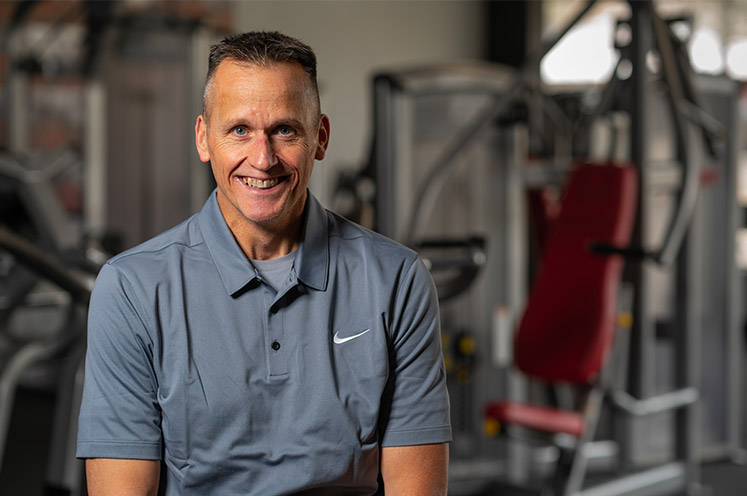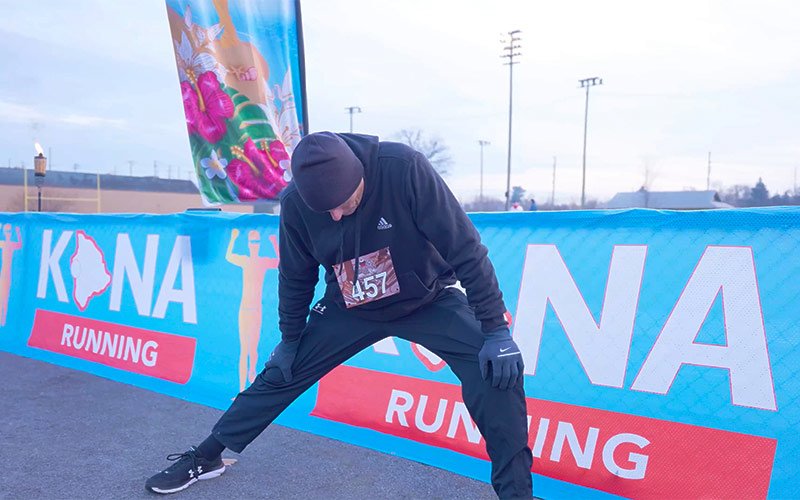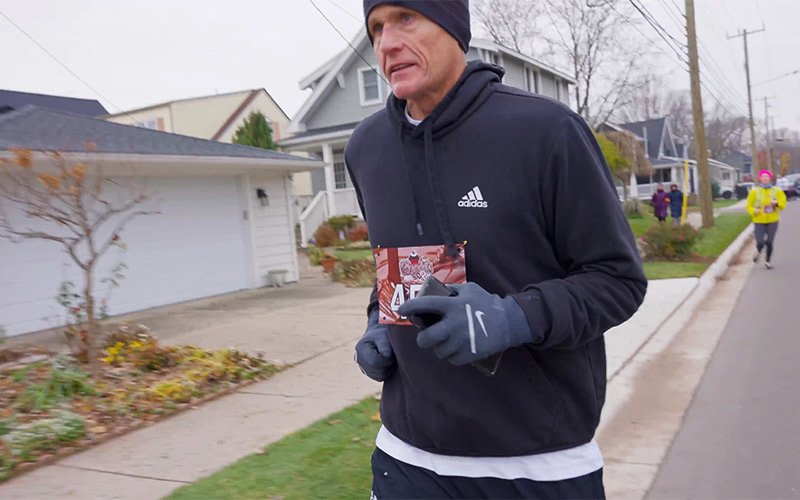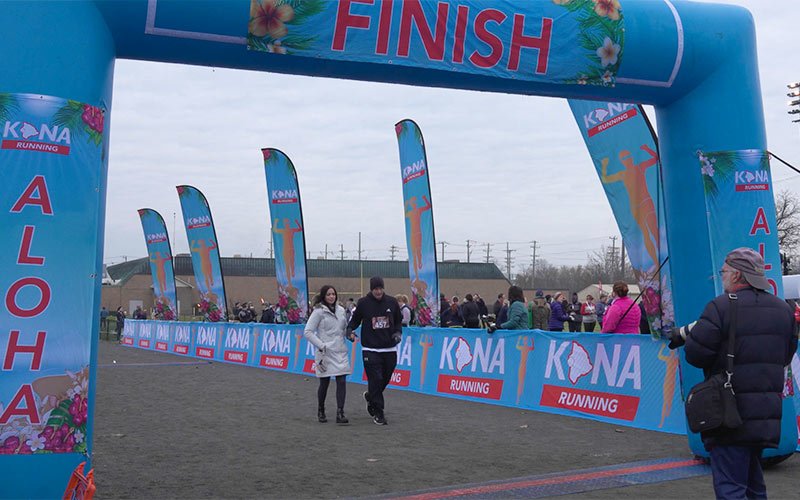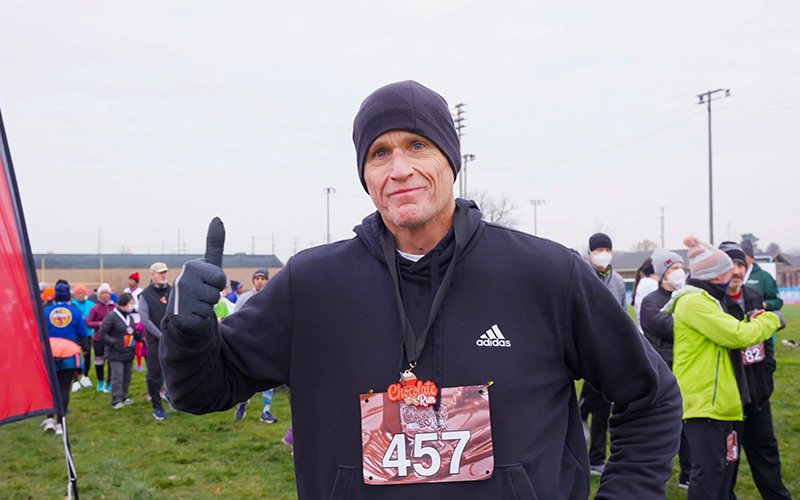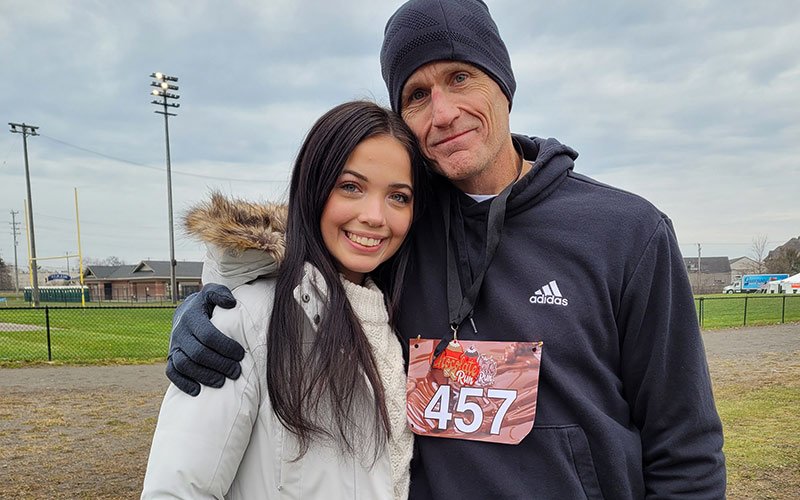True Grit
By the time Dennis Brant arrived at Henry Ford Hospital with advanced heart failure, he had already beaten the odds.
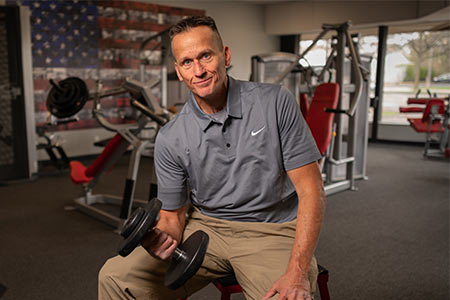
“I’m a cancer survivor,” says Dennis, 51, a construction company owner who lives in Canton.
“It was Father’s Day 2008 when I ran a 5K in downtown Plymouth. My breathing was labored and I could barely make it through the race,” he says. “Turns out, I had a tumor basically the size of a football right in the center of my chest, and by the time I got to the hospital it was pushing against my heart and causing a deadly arrhythmia.” (An arrhythmia is an irregular heart rhythm.) “They asked me if I had my affairs in order.”
His cancer diagnosis was right before the 4th birthday for one of his daughters.
“They originally told me I wouldn’t make it through the night,” Dennis says. “I told them ‘do what you have to do, but I’m going to that party.’ And I did.”
The one-two punch
The cancer diagnosis itself was a complete shock. No one in Dennis’s family had ever had cancer, and Dennis lived a very healthy lifestyle. He didn’t smoke or drink, played football in college and had worked out consistently since he was a teenager. He had also coached high school football and coached his two daughters’ and son’s sports teams.
It was an even greater shock when, two years after beating cancer, Dennis developed heart failure in 2010.
“We know that the chemotherapy cured my cancer, but it also caused my heart issues,” Dennis says. This is known as cardiotoxicity.
Dennis lived with his heart failure for eight years, until he was referred to Henry Ford Hospital. At the time, his ejection fraction (a measure of how effective your heart is at pumping blood to the rest of the body) was at only about 10%, and his body was filled with fluid, a side effect of his heart’s weak pumping ability.
“There were warnings, but I did not notice them,” Dennis says. “I could barely breathe at that point and had a hard time laying down comfortably. I think I was in denial, and my symptoms were so bad I wasn’t thinking clearly.”
A rough recovery
“Dr. Selektor came to me in my Henry Ford Hospital room, and told me that I was in really bad shape, and that they needed to review my situation,” Dennis says. “I was evaluated by a number of people, and they came back with a recommendation that I get an LVAD.”
An LVAD (left ventricular assist device) helps a heart weakened by failure pump blood to the rest of the body.
“What I appreciated so much was how upfront Dr. Selektor was with me and my daughter, Skylar,” Dennis says. “By including Skylar in the conversation and decision-making process, Dr. Selektor empowered my daughter in such a positive way that she’s now graduating from nursing school and is excited about a career in medicine.”
Dennis’s team of specialists, which also included Jennifer Cowger, M.D., and Celeste Williams, M.D., did not come to this decision easily.
“There was a conversation on whether or not I could even handle the surgery,” Dennis says. “It was that bad, and they worked to keep me alive until I could have the procedure.”
Dennis underwent his LVAD surgery in November 2018. While it was successful, he had a long recovery.
“I spent most of the time in the ICU, and I went from 230 to 130 pounds,” Dennis says. “I was very weak after they released me, and was in a wheelchair for four months.”
“The LVAD is my best friend.”
Getting an LVAD often requires significant lifestyle changes, which can be one of the biggest challenges people with heart failure face after the device is implanted. Dennis was no different, but he was determined to have a successful LVAD experience.
“I knew upfront that I had to embrace my LVAD and make it a part of me, because it is a part of me,” Dennis says. “I had to be all in and embrace my situation. There were things I could not do, like shower and other activities involving water. But that was OK. You adapt and there’s always someone worse than you. I was so grateful to be alive.”
Dennis was also focused on not letting the LVAD slow him down as he got back to living a normal life, which required some rethinking.
While an LVAD includes a pump that is surgically implanted into the chest and connected directly to the heart, the full LVAD support system features an external controller and batteries that help to operate and power the system. Many patients carry these components in a bag.
“I was not going to carry a bag around with me,” Dennis says. “First of all, I’m in construction and work with my hands a lot. I also wanted to get back into the gym to start working out again, and a bag wasn’t going to work for me and would just get in the way. So I had to find a better option. Now, I wear my batteries and controller in a pair of shorts with an extra pocket. Most people never even guess I have an LVAD. I operate and look like a completely healthy normal individual, which I feel like I am.”
Support from his teams
In his quest to get the most out of life again, Dennis received support not only from his physicians, but also from Henry Ford Hospital’s LVAD coordinator team.
“Dmitri is my direct coordinator, but I’ve also worked with Jacki, Sarah and Allison,” Dennis says. “They have all been incredible in their support from the moment I got my LVAD. They are truly amazing people. I don’t know what I would have done without them going through the tough times. What is so great about Henry Ford is they give you 24-hour-a-day access to your coordinators and doctors through a pager. They immediately get back to you if you have any problems.”
He’s also been supported by his home team, including his father, mother, brother, two daughters and son.
“My kids have been with me through thick and thin,” Dennis says. “I’m very grateful for everything they’ve done, and that I’ve had this time to spend with them. They are all very successful in their own lives. It makes me extra proud, because they’ve done so much to help me but never got derailed because of my health situations.”
A nearly fatal setback
He needed all of this support when eight months after his LVAD implant, he developed another dangerous arrhythmia.
Says Dennis, “I almost died … again. My heart was beating in the 200s. One of my daughters was home, and she called an ambulance and got me to the nearest hospital.”
The hospital team was able to call Dr. Cowger at Henry Ford, and she walked them through how to treat Dennis, saving his life once again.
“They weren’t equipped to handle a case like mine,” he says. “So they shocked my heart and put me on a helicopter to Henry Ford Hospital, where they implanted an ICD.”
An ICD, or implantable cardioverter defibrillator, helps control an arrhythmia by delivering a shock if the heart’s rhythm gets out of sync.
“I feel like if I didn’t have Dr. Cowger on my team, I would not have made it through that,” Dennis says. “When I was at the other hospital and I heard the doctor talking to her on the phone even before they shocked me, I knew I was going to be OK, because I knew Dr. Cowger would take care of me.”
Longtime goal: Achieved
These days, Dennis is very active once again, and focused on wellness.
“I went from 130 pounds post-surgery to 185 pounds now,” he says. “I am basically all muscle. I do not eat junk food or fast food, I cook every single meal and I’m basically vegetarian for 80% of my meals.”
In the fall of 2021, he also made good on a goal to complete his first 5K in almost 14 years.
“Throughout my treatment for cancer and heart failure, I kept looking back to that last race in Plymouth and telling myself someday I’m going to run another one,” he says.
As with the 2008 race, Dennis faced some struggles.
“I run all the time and was in good shape up until two months before the race,” he says. “I cut my leg at work and had to stop training. Then I threw my back out.”
By the time he got to the starting line, he wasn’t as prepared as he wanted to be. Worse yet, the early morning start and 25-degree temp had a huge impact.
“My body did not warm up until I was almost done with the race,” he says. “I also had some problems with hydration. With an LVAD, you need to have a good balance of fluid, and it was hard to do that at 7:30 in the morning. I usually plan my workouts for later in the day.”
Still, Dennis powered through.
“One thing that kept me going was my daughter, Ava,” Dennis says. Ava was with Dennis at the race, and even crossed the finish line with him.
But as he ran, Dennis also thought about his Henry Ford team.
“Showing up and finishing was a huge accomplishment for me,” Dennis says. “It was a tough race, but throughout it, I kept thinking about the doctors and nurses at Henry Ford, and everything they’ve done for me, and continue to do for me. I actually got very emotional during the race, thinking about this. And I didn’t want to disappoint them. That was the edge I needed to overcome everything and finish the race. I wouldn’t have been able to do this without them.”
A new diagnosis
Recently, Dennis underwent a heart catheterization, and the results showed that he had developed pulmonary hypertension (high blood pressure in the lungs) and an issue with one of his heart valves.
Unfortunately, with this diagnosis Dennis needed a change in his treatment plan. He had been on the list for a heart transplant but was now no longer eligible.
“Bad news motivates me,” Dennis says. “Up until that point I was lifting weights at home and in the gym. They told me I needed to shift to aerobic exercise instead. So now, I’m walking 5 miles a night on the treadmill. I’m determined to improve my health enough to get back on the transplant list.”
After his many setbacks, Dennis is also back running his construction business that he’s owned for 25 years (Innovative Construction Solutions).
“In part due to all of my medical issues, I’ve had to restart my business four times from nothing,” he says. “In 2005, business was booming and I won national awards, including Contractor of the Year. Cancer took about 50% of my business away, then the economy crashed. I made it through that, then heart failure.”
Now, Dennis works up to 70 hours a week performing construction tasks and running the business.
While he’s looking forward, Dennis also looks back, and is grateful for the treatment he received at Henry Ford Hospital.
“It’s such an incredible hospital,” Dennis says. “I believe God has worked through the people at Henry Ford, and that me being alive is a miracle. Their diversity is their strength, and is an example of what we can be as a global community. You’ve got people from so many different countries, so many different nationalities working there, it’s a true melting pot. They’re all aligned with one goal, from the administrators to the cleaning crew, providing the best care for every patient. I’ve spent months at that hospital, and everyone there is truly my second family. They’re all heroes in my book.
“The thing I love most about Henry Ford Hospital is when there are roadblocks in your health and the odds are stacked against you Henry Ford always finds a way to move forward and solve the problems and give you the greatest chance at the healthiest life possible. Henry Ford does not quit and I will never stop fighting or give up. I believe that’s what makes us an incredible team as an institution and a patient, the never quit attitude and always giving everything we have.”
.svg?iar=0&hash=F6049510E33E4E6D8196C26CCC0A64A4)

/hfh-logo-main--white.svg?iar=0&hash=ED491CBFADFB7670FAE94559C98D7798)
